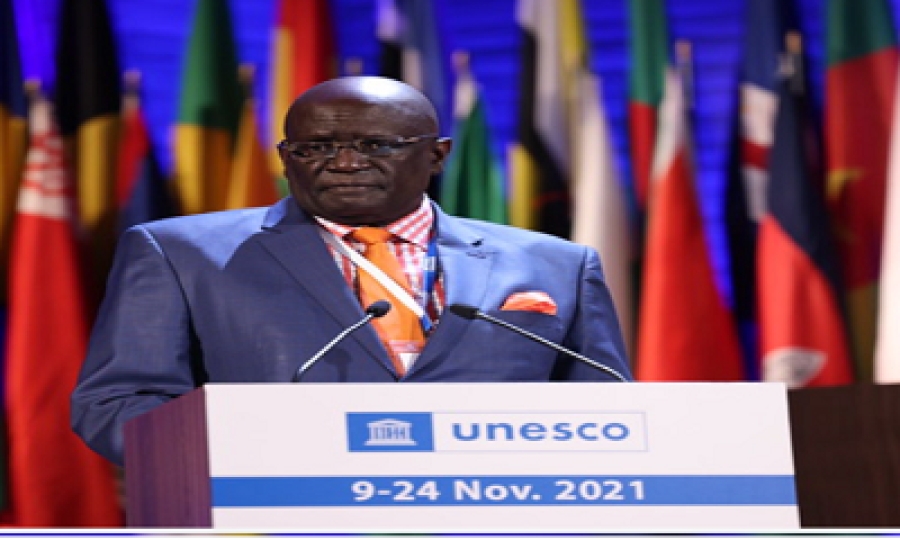41st Session of UNESCO General Conference
Written by John Odhiambo & George Kiruja, CEMASTEA
The 41st UNESCO’s General Conference (GC) was held in Paris, France, from 9th to 24th November 2021 at the UNESCO Headquarters. UNESCO’s General Conference (GC) is the apex decision-making organ of the organization. It comprises all Member States and is held every two years to determine UNESCO's policies and focus areas. In the 41st (GC) attending delegations highlighted the effects of COVID-19 and their post-Covid-19 recovery strategies, challenges being experienced in the education sector and the way forward.
Cabinet Secretary MoE, Prof. George Magoha delivering the Kenya message during the Conference
The Kenya National Commission for UNESCO, KNATCOM, spearheaded the preparations for the Kenyan delegation. Cabinet Secretary Ministry of Education Prof. George Magoha led the Kenyan delegation. Others included members of the National Assembly, the Senate, Principal Secretaries and Officers in government. Mrs Jacinta Akatsa, Director, accompanied by Mr George Kiruja, and Mr John Odhiambo led the team from CEMASTEA. The CS delivered the Kenyan Policy Statement on 15th November. H.E. Santiago Irazabal Mourao, Ambassador, Permanent Delegate of Brazil to UNESCO, was elected as President of the 41st session of the General Conference.
In his speech, CS Magoha congratulated Ms Audrey Azoulay upon her re-election as Director-General of UNESCO and noted that Kenya looked forward to working closely with her during her second term in office. He lauded the Secretariat for the solid support for the Member States during the COVID-19 pandemic. The CS highlighted some areas of concern in education to the Kenya Government. These included; the need for continued collaboration among member states to mitigate the effects of Covid-19 pandemic on education; innovation and coordination to protect and promote education and accelerate progress towards the achievement of SDG4; Kenya’s support to UNESCO’s role in strengthening international scientific cooperation, open science and address the climate crisis and; gender equality. The presentation by UNESCO focused on what quality education should do to humanity where every child, youth and adults fully realize their transformational potential of education as a route for sustainable collective futures. It called for the ‘new social contract for education to repair injustices while transforming the future’.
Dr. Mulambe (centre), Director, Policy, Partnerships & Linkages-MoE),
Director, CEMASTEA, Jacinta Akatsa (left) with other Kenyan Delegates
The Global Education Meeting held on 10th November and Co-chaired by French President Emmanuel Macron, and UNESCO Director-General Audrey Azoulay led to the adoption of the Paris Declaration. Member countries declared their total support of the education agenda and committed to improving investments in education through public and public-private cooperation. The team from CEMASTEA used the opportunity to network with other delegations to acquire ideas to transform CEMASTEA programmes.
Latest from Esther Nyambura
- CEMASTEA Hosts Successful INSET Centre Principals’ Workshop
- CEMASTEA Conducts Successful Holistic Learning Training for Rwandan Teachers
- Empowering Quality Standards and Assurance Officers (QASOs) for Enhanced STEM Education
- Science and Mathematics Teachers Pilot Symposium: Innovative Classroom Practices
- CEMASTEA Strategic Plan 2023 – 2027: Key Highlights

